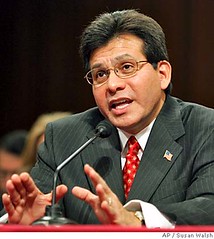 Image by MMMMichelle via Flickr
Image by MMMMichelle via Flickr
WASHINGTON (AP) -- In the special interest war over health care, the White House and congressional Democrats have the nation's drug makers and hospitals generally on their side; the insurance industry, not so much.
Now the bill's supporters are making a play to lock in the American Medical Association, the organization that says it represents 250,000 doctors and medical students in every state and congressional district. The principal enticement, a $247 billion measure making its way to the Senate floor, aims to wipe out a scheduled 21 percent rate cut for doctors treating Medicare patients and replace it with a permanent, predictable system for future fee increases.
The AMA, firmly in favor of higher pay for doctors, began airing ads last week saying the increase would "protect seniors' access to quality care." In case lawmakers need any inducement to act, a late 2008 study by the Medicare Payment Advisory Commission, which advises Congress, found that nearly 30 percent of Medicare patients looking for a new primary care doctor had trouble finding one.
Yet the AMA won't yet pledge support for the major health care bill that is the chief objective of the White House and congressional Democrats, despite a request that several officials say was made at a meeting last week with Senate Majority Leader Harry Reid, D-Nev.
Nor does it seem eager to soft-pedal another of its own top priorities, legislation to restrict medical malpractice payments.
"We continue to press for significant medical liability reform because we know that is a very important contributor to unnecessary health care costs," Dr. J. James Rohack, president of the AMA, said in an interview in which he decli! ned repe atedly to say whether the organization had been asked to back off.
Higher payments to doctors and curbs on medical malpractice awards "in my mind are separate issues. I can't speak for how other people are putting this whole thing together," he added.
Evidently not in the minds of Democrats. Several officials say that request, too, was conveyed to the AMA and other doctor groups in last week's session with Reid. Not coincidentally, any limitations in medical malpractice awards are anathema to trial lawyers, whom Democrats count as among their most reliable and generous campaign supporters.
The dance is one of many in the long-running health care debate, the issue that has consumed Congress, the administration and a vast constellation of outside groups for months.
Take the Senate Finance Committee, which last week approved a middle-of-the-road measure that may eventually prove a template for a compromise on an issue that has defied solution for decades. Sen. Olympia Snowe of Maine drew headlines when she became the first Republican to support White House-backed health care legislation.
But according to some of the bill's supporters, a vote that occurred with little fanfare several evenings earlier was crucial to the legislation's survival.
It pitted the drug makers and the White House on one side and most of the committee's Democrats on the other.
At issue was a plan by Sen. Bill Nelson, D-Fla., to sweeten drug benefits for certain Medicare beneficiaries - normally something all lawmakers can favor. In this case, Nelson proposed raising fees on drug companies by $106 billion over a decade to cover the costs. "Did PhRMA come to the table in the agreement with the White House with enough? A number of us feel that is not the case," he said of the industry.
But his approach happened to run afoul of a deal! the ind ustry made months ago with the White House and Sen. Max Baucus, D-Mont., the committee's chairman. Drug makers would cover $80 billion of the cost of the legislation over a decade, and the White House and Baucus would help shield them from attempts by other lawmakers to impose additional fees or taxes.
Left undisclosed for weeks was a critical codicil - that the industry would bankroll an expensive advertising campaign to promote the bill's passage, at a cost of $100 million or more.
Passage of Nelson's proposal "may well undermine our ability to pass comprehensive health care reform in this Congress and I think that would be a great tragedy," Sen. Tom Carper, D-Del., said shortly before the vote.
Baucus, too, spoke against Nelson's recommendation, although he added, "we have to find some other time and some other way to fill the doughnut hole," a reference to a gap in coverage under the Medicare prescription drug program.
Of Nelson, Baucus said, "I frankly wish the senator had decided not to push" for a vote.
Not only Baucus, but also the White House had urged Nelson to drop his amendment, according to Senate sources who spoke on condition of anonymity. On the vote, the chairman, Carper and Sen. Bob Menendez, D-N.J., joined all committee Republicans in opposing the plan, and it failed on a vote of 13-10.
The drug deal was secure, and so, too, the bill.
Special interest politics was also at play for the nation's hospitals. They, too, have a side deal with the White House and Baucus, and they also received a measure of protection in the bill that cleared the committee.
At the last minute, the chairman decided to shield them from any future cuts to be recommended by an independent commission charged with recommending savings in Medicare.
The insurance industry?
Reid made an unusual appearance at a Senate committee hearing recently to support repeal of 60-year-old antitrust laws that benefit insurance companies.
---
EDITOR'S NOTE - David Espo is chief congressional correspondent for The Associated Press.
© 2009 The Associated Press. All rights reserved. This material may not be published, broadcast, rewritten or redistributed. Learn more about our Privacy Policy.


0 comments